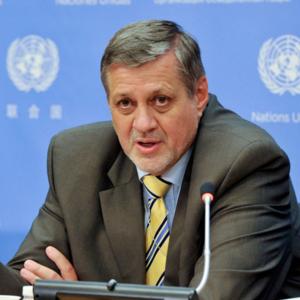Excellency, Karim Sinjari, Minister for Interior, Kurdistan Regional Government,
Honorable Members of Parliament and Heads of Blocs, of Parliament in Baghdad and in Erbil
Distinguished Members of the Panel,
Excellencies, Representatives of the Diplomatic Corps,
Distinguished Civil Society Representatives,
Salaam Aleykum!
I wish to begin with congratulating the Iraqi Security Forces, Peshmerga, PMF and allied tribal and local volunteers on the start of their historic battle to liberate Mosul, Ninewa. This campaign is marked by unprecedented historic cooperation between the ISF and Pershmega. We honour the martyrs who paid the highest sacrifice for free Iraq. This Mosul liberation operation marks the beginning of the end of the so-called Daesh Caliphate in Iraq. Steady successes in fighting Daesh and increased support of the civilian population in this effort speak best about the fact that liberation of Iraq is a fight of all Iraqis in their unity for the future of their country as a common house of all Iraqi people men, women and children, citizens from components ethnic and religious, groups, minorities living in justice, equality, peace and tolerance.
Let us not forget that the people of Iraq also fight in defense of human values shared by the whole world. Today, we also stand here in solidarity with the abducted, abused and violated women and girls, their families and communities. Women and children are first victims of Daesh crimes and as the United Nations we insist on full accountability for the human rights abuses and atrocities perpetrated by Da’esh against civilians notably against women and children and call for justice for all the victims of these heinous crimes that might represent crimes against humanity.
Excellencies, esteemed participants,
Let me thank the Government of Iraq, the Kurdistan Regional Government and the Iraqi- National Action Plan 1325 Initiative for convening this conference and the Government of the Netherlands and the Euromed Feminist Initiative for supporting it with the aim, not only, to mark the 16th anniversary of Security Council Resolution 1325, but also, more importantly, to present to key stakeholders progress made thus far in the implementation of the National Action Plan on 1325.
Notably in the forthcoming post-Daesh period, the implementation of the National Action Plan on 1325 presents a great opportunity to translate the vision of 1325 into actions to improve the lives of Iraqi women and girls.
I also welcome the efforts of the Government of Iraq and the KRG to address conflict-related sexual violence including the recent signing of a Joint Memorandum with the UN to Prevent and Respond to Conflict-Related Sexual Violence. I reiterate the call for the establishment of an inter-ministerial taskforce to oversee and coordinate the implementation of this important agreement alongside the implementation of the National Action Plan on 1325 and work as regards children affected by armed conflict. It is important that these frameworks are harmonized.
Comprehensively addressing the issues covered by the Action Plan and the impact of conflict-related sexual violence will also necessitate examining women’s political representation and participation and governance structures in the aftermath of the conflict with ISIL. Effective institutions to guarantee women’s protection, and their full participation in political, security and administrative arrangements are needed, including essential affirmative quotas for women in governance structures. It is equally important to advance the role of women as actors in peace-building. They shall be included in community local and national reconciliation efforts. Women shall also be part of the stabilization and reconstruction efforts undertaken in areas liberated from ISIL-control. And, women have a key role to play in halting the spread of hate speech and incitement. In this regard, I urge the Government of Iraq and the KRG to integrate the Women, Peace and Security agenda into its’ strategies to counter violent extremism and terrorism.
On our part, the United Nations continues to provide the needed support as requested. Furthermore, women, peace and security perspectives have been incorporated within the ongoing humanitarian response support provided to the Government of Iraq and the Kurdistan Regional Government. United Nations works closely with the relevant government entities at federal and regional levels to ensure the needs of displaced women and girls including the provision of psycho-social support and maternal health care are met.
I am aware that funding for the full implementation of the Plan and for addressing conflict-related sexual violence remains a challenge. Notwithstanding, budgetary and fiscal shortfall should not diminish the responsibility of the Governments in Baghdad and Erbil to fulfil obligations to protect women’s rights. I also urge the international community and the UN to continue and increase support to the Government in Baghdad and Erbil, the civil society, women groups in this area. Without such support progress will be much less than desirable.
Thank you.


